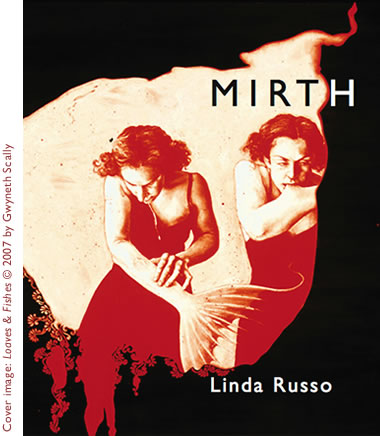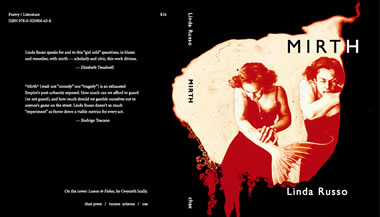
11 MAY 07
How has your first book changed your life?
56. Linda Russo

How did your manuscript happen to be picked up by Chax Press? Had you sent it out much previously?
Mirth went through several incarnations before becoming Mirth, and I'd sent it out in different forms for about three years-- perhaps to 7 or 8 presses whose work I've followed closely for some time--before it caught the eye of Charles Alexander.
Were you involved in designing the cover?
Charles and I worked very closely on the whole book, but on the cover moreso than anything else. I described to him my vision for a cover--featuring an image figurative yet not literal (i.e. strange and familiar at once) and entering into the space--floating in, really--from one corner. Charles suggested I might like the work of Gwyneth Scally, a Tucson-based artist. Sure enough, her organic/mythical/ambiguously emotive image "Loaves and Fishes" drew me in instantly. The multivalence of the image--she's biting, impressing upon, or merely tasting herself, or the marinelife she is becoming--captured the idea of "mirth" I had in mind: hopeful (perhaps even joyful) and grave at once, going through the process of these sensations, moving toward some future manifestation. There's a good bit of Ovid in Mirth, and in a purely witty sort of way this is suggested in the woman's metamorphosis. As for the cover design, I love the bright, oily "drop" floating against the black surface. I like the way the image and the cover seamlessly blend.

What do you remember about the day when you saw your finished book for the first time?
A Holiday Inn concierge delivered the package to me, tingeing an otherwise fraught period of my life with a sense of import. This to me is indicative of the care Charles gave to the project at each step. I don't know if many poets nurture a similar sense about their first book (or perhaps any book for that matter), but in my mind the book Mirth is inseparable from the experience of working with Charles.
Before that day, did you imagine your life would change with its arrival?
I suppose I thought the arrival might be more emotional and dimensional than it in fact was. I'm not very keen on thinking about Mirth in terms of its or my "success"--I'm just not sure what that means in this case. I hadn't forecast any change; I was merely anticipating the arrival of the material object. It was so long in the coming that any "change" was already realized, perhaps, in editing the manuscript. But the book object provided a sort of background happiness that kept me going during a rough period. I didn't have a lot of time at that moment to really dote on the book, and I was very isolated--staying at a Holiday Inn in a strange city.
How has your life been different since? Were there surprises?
I've done a few readings and signed books; the book has been sold and I've given it away; I've made and received comments about Mirth because of these activities. For instance, I was unofficially dubbed the most morbid poet at a local literary festival. Such moments are welcome, but my "life" is not different. One moment resonates with my life more than the others, though. As I said, I didn't get to dote on Mirth--not until a week or so later, when I went to visit my family. My mother was essentially Mirth's first reader, and she loved it. I felt, on the one hand, that the book served to establish some sort of understanding about the weird shape my life has taken, in my parents', and to some degree my siblings', eyes. On the other hand, this confirmed for me that despite its disjunctive, parodic, dark, ambiguous, critical, and political moments, one doesn't need a Ph.D. to "get" Mirth. It broached, for those few days that I was home, entirely new conversations amongst my family.
And I thought I'd get a job. I thought I'd be offered six or seven jobs. This did not happen. The biggest surprise was learning that an undergraduate English major at the University of Oklahoma is writing an essay on my work.
What have you done to promote the book?
I'm not much of a self-promoter, and I don't beat myself up over that fact. Aside from giving readings and lining up more readings in the future, I haven't done much. I don't have a blog. I announced it on a listserve or two. Charles has sent out review copies.
What was the best advice you got?
The best advice I got was in the manuscript stage: put your new work first. That decision acted as a cornerstone and the rest of the sections fell into place after that. It helped me let the book be finished and no longer in-progress.
What influence has the book's publication had on your subsequent writing?
It allowed me to think consciously about doing something different.
How do you feel about the critical response? Has it had any effect on your writing?
I've made note of a few critical responses--if by that you mean some form of written attention from a reader who may or may not be a friend. No effect; I don't really expect there to be one at this stage. My writing has long very much been, for better or for worse, oblivious to whatever hackles or praises it may raise.
Do you want your life to change?
I rarely find myself not "wanting" change. That's not to say I'm not at moments not discontent. But I often look forward to another set of circumstances, another context, to live my life in.
Is there something you're doing now that you think will bring about a change that you seek?
Yes. I'm trying.
Do you believe that poetry can create change in the world?
I do. Poetry is a form of attention and intention; it's a material engagement. It changes the individual--being a poet is, to me, allowing yourself to get swept up in the great sea of potential that is working with language. I've seen poetry change things for individuals, mostly younger poets. I wouldn't go so far as to say that poetry can create change "in the world" because it (the world) is made of things (structures, ideologies, inequities, etc.) that poetry can't effectively change. But on individual bases, yes--poetry can create change for the individual interacting with their world. That's one very good reason that writing is written.
:
A poem from Mirth by Linda Russo:
Strategies for Anxiety Cure
It's not just that your friends annoy me.
I haven't had a proper breakfast
for thirteen years. If we
don't keep up with current events
are they current? My toes, also pink, stink.
Under our system the statesman has such status.
I am an island, I am a rock, and fragrant, and my strategies
for sadness are none of your business.
Here's something we can all chew on. Pork is still
the other white meat. But could we just hold each other?
In the dream it persisted. Though canned ham is cured.
I can't tell you where I'm going with this.
I'm not lonely--I'm just getting restless!
I don't see any ships or waves. Or casseroles.
I have not been on my knees like the chore
demands. I just can't get myself to do it, I'm a fear factor
failure straight from the disposition factory. Who am I
kidding? I have not been on my knees or asked to get on my knees.
No one actually said my boobs were all wrong.
I shouldn't swear. I do.
Is this the right skirt? Does it look right on me?
. . .
next interview: Zachary Schomburg
. . .